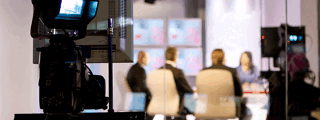Birmingham School of Media’s Dr Vanessa Jackson shares tips on how to manage a television studio team and the skills required to be successful when working in a live TV studio environment
The best way to prepare to air live on TV.
Pre-production preparation is key when preparing for a live TV show. It can be useful to draw up a detailed running order, which lists the different items you are going to include, and the order they are going to be covered in. Timing is everything with live programming - you must give each item a duration and stick to it.
I would also recommend writing a presenter’s script, with the introduction and the links in to and out of each item, along with any questions the presenter should answer during the programme.
Making sure that you’ve got all the props needed is essential. I would advise having a technical meeting with all the crew so that they know what and when anything is happening in the show. Rehearsing the show is also a crucial part of preparation - the lack of rehearsal on camera can lead to a disaster when broadcasting.
The skills required when running a live TV programme.
The top five skills I believe a strong gallery production assistant and a good floor manager should possess are:
-
Being able to stay calm under pressure
-
Being organised
-
Being decisive
-
Being able to anticipate problems
-
Relaying information clearly and succinctly
There is so much going on during a live show that if the communication isn’t clear, and the director isn’t experienced and decisive, the show is likely to be a disaster.
The production assistant in the gallery is managing the timings and letting the director know how much time is left on the item. If the director doesn’t listen and react to the PA’s timings, then the show is likely to over or under-run. Likewise, if the PA isn’t timing the whole show duration, as well as the individual items, then they won’t have an accurate duration and the whole thing will over or under-run.
The most common pitfalls on a live TV set.
The parts that go wrong are often when the host must move from one item to the next, and it is important that these moments are rehearsed. One presenter might need to ‘throw’ to another, or pick up out of a pre-recorded insert, and these can be messy.
The presenters should check and personalise the script, and the producer should make sure that the presenters know how to pronounce any tricky names etc, as this can affect the reputation of the show. Presenters speaking to the wrong camera also happens frequently so ensure there is a plan in place on the script, so the presenter knows which camera is going to be running at each point of the show.
The final common pitfall is items over-running, or even worse under-running, which can cause real problems - especially when getting ‘off-air’ smoothly, it can pose quite a challenge and can be extremely awkward to watch as a viewer.
Dr Vanessa Jackson teaches Media Production at Birmingham City University and previously worked in television production at the BBC for over 20 years. She teaches practical television craft and production skills to undergraduates covering both documentary and drama.
Media Courses
Find out more about our courses





